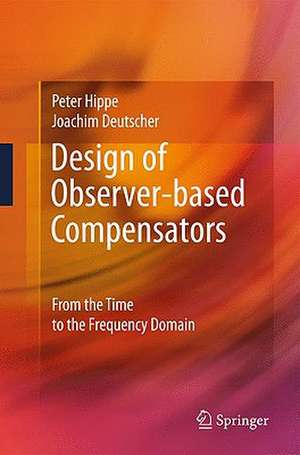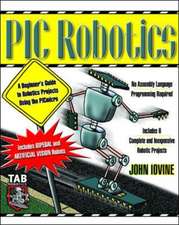Design of Observer-based Compensators: From the Time to the Frequency Domain
Autor Peter Hippe, Joachim Deutscheren Limba Engleză Hardback – 25 mai 2009
Frequency domain design of observer-based compensators of all orders is covered. The design of decoupling and disturbance rejecting controllers is presented, and solutions are given to the linear quadratic and the model matching problems. The pole assignment design is facilitated by a new parametric approach in the frequency domain. Anti-windup control is also investigated in the framework of the polynomial approach. The discrete-time results for disturbance rejection and linear quadratic control are also presented.
The book contains worked examples that can easily be reproduced by the reader, and the results are illustrated by simulations.
| Toate formatele și edițiile | Preț | Express |
|---|---|---|
| Paperback (1) | 944.67 lei 6-8 săpt. | |
| SPRINGER LONDON – 13 oct 2010 | 944.67 lei 6-8 săpt. | |
| Hardback (1) | 950.66 lei 6-8 săpt. | |
| SPRINGER LONDON – 25 mai 2009 | 950.66 lei 6-8 săpt. |
Preț: 950.66 lei
Preț vechi: 1159.34 lei
-18% Nou
Puncte Express: 1426
Preț estimativ în valută:
181.91€ • 194.52$ • 151.67£
181.91€ • 194.52$ • 151.67£
Carte tipărită la comandă
Livrare economică 18 aprilie-02 mai
Preluare comenzi: 021 569.72.76
Specificații
ISBN-13: 9781848825369
ISBN-10: 1848825366
Pagini: 300
Ilustrații: XIII, 285 p.
Dimensiuni: 155 x 235 x 25 mm
Greutate: 0.59 kg
Ediția:2009
Editura: SPRINGER LONDON
Colecția Springer
Locul publicării:London, United Kingdom
ISBN-10: 1848825366
Pagini: 300
Ilustrații: XIII, 285 p.
Dimensiuni: 155 x 235 x 25 mm
Greutate: 0.59 kg
Ediția:2009
Editura: SPRINGER LONDON
Colecția Springer
Locul publicării:London, United Kingdom
Public țintă
ResearchCuprins
Polynomial Matrix Fraction Descriptions.- State Feedback Control.- State Observers.- Observer-based Compensators.- Parametric Compensator Design.- Decoupling Control.- Disturbance Rejection Using the Internal Model Principle.- Optimal Control and Estimation.- Model-matching Control with Two Degrees of Freedom.- Observer-based Compensators with Disturbance Rejection for Discrete-time Systems.- Optimal Control and Estimation for Discrete-time Systems.
Recenzii
From the reviews:
“This book uses polynomial matrices to develop a frequency-domain approach for the design of observer-based compensators. … The work is generally self-contained and easy to read … . Each chapter starts with an introduction which presents its topic, history and content. A significant number of worked-out examples illustrate the concepts and algorithms provided. Many results have been obtained by the authors in a series of papers indicated in the references. … presents a selection of the most important and useful works in the field.” (Valeriu Prepeliţă, Mathematical Reviews, Issue 2011 e)
“This book uses polynomial matrices to develop a frequency-domain approach for the design of observer-based compensators. … The work is generally self-contained and easy to read … . Each chapter starts with an introduction which presents its topic, history and content. A significant number of worked-out examples illustrate the concepts and algorithms provided. Many results have been obtained by the authors in a series of papers indicated in the references. … presents a selection of the most important and useful works in the field.” (Valeriu Prepeliţă, Mathematical Reviews, Issue 2011 e)
Notă biografică
Peter Hippe was born in Berlin in 1941. He received the Dipl.-Ing. degree in mechanical engineering from Universität Stuttgart, Stuttgart in 1969 and the Dr.-Ing. degree from Friedrich-Alexander Universität, Erlangen in 1976. Since then he has been teaching in the Electrical Engineering Department. His main research interests are in the time and frequency domain design of compensators and the problems caused by constrained actuators. He has coauthored the book Zustandsregelung (Springer, 1985) and he is the author of the book Windup in Control (Springer, 2006)
Joachim Deutscher was born in Schweinfurt, Germany in 1970. He received the Dipl.-Ing. (FH) degree in Electrical Engineering from Fachhochschule Würzburg- Schweinfurt-Aschaffenburg in 1996, the Dipl.-Ing. Univ. degree in Electrical Engineering and the Dr.-Ing. degree from Universität Erlangen-Nürnberg in 1999 and 2003, respectively. He is head of the nonlinear control systems group at the Lehrstuhl für Regelungstechnik, Universität Erlangen-Nürnberg. His main research interests are in nonlinear control and in the application of polynomial matrix methods in control.
Joachim Deutscher was born in Schweinfurt, Germany in 1970. He received the Dipl.-Ing. (FH) degree in Electrical Engineering from Fachhochschule Würzburg- Schweinfurt-Aschaffenburg in 1996, the Dipl.-Ing. Univ. degree in Electrical Engineering and the Dr.-Ing. degree from Universität Erlangen-Nürnberg in 1999 and 2003, respectively. He is head of the nonlinear control systems group at the Lehrstuhl für Regelungstechnik, Universität Erlangen-Nürnberg. His main research interests are in nonlinear control and in the application of polynomial matrix methods in control.
Textul de pe ultima copertă
Design of Observer-based Compensators presents the frequency domain design of observer-based controllers in complete correspondence to well-known time domain results and gives connecting relations at every design stage. This facilitates and adds transparency to the design in the frequency domain which is not as well-established among control engineers as time-domain design. The presentation of the design procedures starts with a short review of the time domain results; therefore, the book also provides quick access to state space methods for control system design.
The frequency domain design of observer-based compensators of all orders from the full-order to the completely reduced-order compensator is covered. The design of decoupling and disturbance rejecting controllers is presented. Furthermore, solutions are given to the linear quadratic and the model matching problems. The pole assignment is facilitated by a new parametric approach which is formulated directly in the frequency domain. Anti-windup control is also investigated in the framework of the polynomial approach. Though mainly continuous-time systems are considered, the discrete-time results for disturbance rejection and linear quadratic control are also presented.
The monograph contains worked examples that can easily be reproduced by the reader, and the results are illustrated by simulations.
Design of Observer-based Compensators will be of use as a reference for control engineers, graduate students and researchers who are familiar with the time domain design and who want to become acquainted with the frequency domain design using polynomial matrices.
The frequency domain design of observer-based compensators of all orders from the full-order to the completely reduced-order compensator is covered. The design of decoupling and disturbance rejecting controllers is presented. Furthermore, solutions are given to the linear quadratic and the model matching problems. The pole assignment is facilitated by a new parametric approach which is formulated directly in the frequency domain. Anti-windup control is also investigated in the framework of the polynomial approach. Though mainly continuous-time systems are considered, the discrete-time results for disturbance rejection and linear quadratic control are also presented.
The monograph contains worked examples that can easily be reproduced by the reader, and the results are illustrated by simulations.
Design of Observer-based Compensators will be of use as a reference for control engineers, graduate students and researchers who are familiar with the time domain design and who want to become acquainted with the frequency domain design using polynomial matrices.
Caracteristici
Shows the reader how to interconvert time- and frequency-domain representations of the same control system The same state-space framework copes equally well with single-input, single-output and multiple-input, multiple-output systems Includes supplementary material: sn.pub/extras











